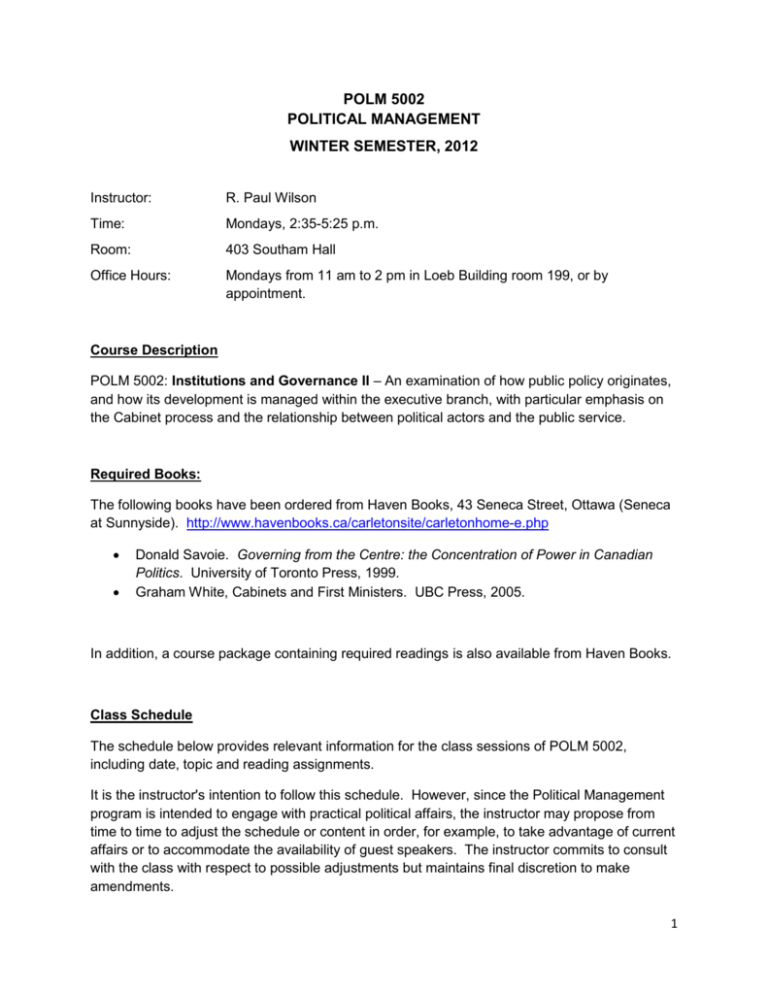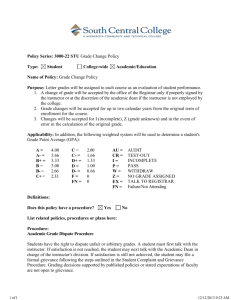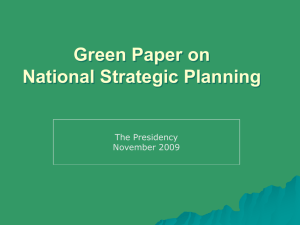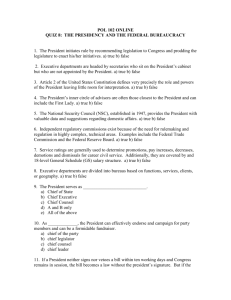POLM 5002: Institutions and Governance II – An examination of how
advertisement

POLM 5002 POLITICAL MANAGEMENT WINTER SEMESTER, 2012 Instructor: R. Paul Wilson Time: Mondays, 2:35-5:25 p.m. Room: 403 Southam Hall Office Hours: Mondays from 11 am to 2 pm in Loeb Building room 199, or by appointment. Course Description POLM 5002: Institutions and Governance II – An examination of how public policy originates, and how its development is managed within the executive branch, with particular emphasis on the Cabinet process and the relationship between political actors and the public service. Required Books: The following books have been ordered from Haven Books, 43 Seneca Street, Ottawa (Seneca at Sunnyside). http://www.havenbooks.ca/carletonsite/carletonhome-e.php Donald Savoie. Governing from the Centre: the Concentration of Power in Canadian Politics. University of Toronto Press, 1999. Graham White, Cabinets and First Ministers. UBC Press, 2005. In addition, a course package containing required readings is also available from Haven Books. Class Schedule The schedule below provides relevant information for the class sessions of POLM 5002, including date, topic and reading assignments. It is the instructor's intention to follow this schedule. However, since the Political Management program is intended to engage with practical political affairs, the instructor may propose from time to time to adjust the schedule or content in order, for example, to take advantage of current affairs or to accommodate the availability of guest speakers. The instructor commits to consult with the class with respect to possible adjustments but maintains final discretion to make amendments. 1 Week 1 (January 9 ): Cabinet and "The Centre" An introduction to the course, and a theoretical perspective on the Cabinet, the Prime Minister and the locus of power in the Canadian federal system. Readings: MacGregor Dawson, "The Cabinet: Position and Personnel." Canadian Journal of Economics and Political Science, vol. 12 (3), August 1946, pp. 261-281. Donald Savoie, Governing from the Centre, pp. 1-67. Graham White, Cabinets and First Ministers, pp. 1-63. Week 2 (January 16): The Prime Minister's Office The political roots of government policy direction (platform, mandate letters, Speech from the Throne) and the role of PMO, as well as the GIC appointments process and OIC database. Readings: Donald Savoie, Governing from the Centre, pp. 71-108. Graham White, Cabinets and First Ministers, pp. 64-101, 170-186. Marc Lalonde (1971). "The Changing Role of the Prime Minister's Office." Canadian Public Administration. 14(4):509-537. Available on line via Carleton Library. Speech from the Throne, June 3, 2011. http://www.speech.gc.ca/eng/index.asp Week 3 (January 23): Privy Council Office The role of PCO and its senior personnel. Readings: Gordon Robertson (1971). "The Changing Role of the Privy Council Office." Canadian Public Administration. 14(4): 487-508. Available on line via Carleton Library. Donald Savoie, Governing from the Centre, pp. 109-55. PCO (2011), The Role and Structure of the Privy Council Office. http://www.pco.gc.ca/index.asp?lang=eng&page=information&sub=publications&doc=rol e/role2010-eng.htm Week 4 (January 30): Cabinet Process The federal Cabinet and its subcommittees, including composition, powers, process and paperwork. Readings: 2 Graham White, Cabinets and First Ministers, pp. 102-169 Memoranda to Cabinet templates and Drafter's Guide to Memoranda to Cabinet. Available at: http://www.pcobcp.gc.ca/index.asp?lang=eng&page=information&sub=publications&doc=mc/mc_e.htm Cabinet committee membership and mandates. Available at: http://www.pm.gc.ca/eng/feature.asp?pageId=53&featureId=8 Memorandum to Cabinet obtained under Access to Information Act (pending availability) Week 5 (February 6): Finance and Budget Process The federal budget process and the fiscal framework, including the role of the Minister of Finance, the Department of Finance, and other participants including the Prime Minister, other Ministers, PCO, Treasury Board Secretariat, and outside stakeholders. Edward Greenspan and Anthony Wilson-Smith (1996). Double Vision: The Inside Story of the Liberals in Power. Doubleday Canada. pp. 195-202, 207-216, 225-227, 235-251, 253-267, 270-278 (in course package) Janice MacKinnon (2003). Minding the Public Purse: the Fiscal Crisis, Political Tradeoffs and Canada's Future. McGill-Queen's University Press. pp. 97-129. (in course package). David Good (2007). The Politics of Public Money: Spenders, Guardians, Priority Setters, and Financial Watchdogs Inside the Canadian Government. University of Toronto Press. pp. 93-117. (in course package). Office of the Parliamentary Budget Officer (2008), "The Government of Canada's Economic and Fiscal Forecasting Process." http://www.parl.gc.ca/PBODPB/documents/Forecasting%20Process%20-%20EN.pdf Donald Savoie, Governing from the Centre, pp. 156-192. Week 6 (February 13): Federalism Reading: Patrick Monahan (1991). Meech Lake: The Inside Story. University of Toronto Press. pp. 101-136 (in course package). Canadian Intergovernmental Conferences Secretariat, "First Ministers' Conferences, 1906-2004." http://www.scics.gc.ca/CMFiles/fmp_e.pdf Robin Boadway, "Canada." http://www.forumfed.org/libdocs/Global_Dialogue/Book_4/BK4-en-ca-Boadway.pdf Health Council of Canada, "Rekindling Reform: Health Care Renewal in Canada, 20032001." pp. 5-11. Available at: 3 http://www.healthcouncilcanada.ca/docs/rpts/2008/HCC%205YRPLAN%20(WEB)_FA.p df Prime Minister Paul Martin, Address at First Ministers' Meeting, September 13, 2004. http://www.hc-sc.gc.ca/hcs-sss/delivery-prestation/fptcollab/2004-fmm-rpm/speechesdiscours-eng.php CBC News, "Anatomy of an Agreement," September 16, 2004. http://www.cbc.ca/news/background/healthcare/firstminconf.html Paul Wells, "Harper and the death (for now) of executive federalism," blog, Nov. 10, 2008. http://www2.macleans.ca/2008/11/10/stephen-harper-and-the-death-for-now-ofexecutive-federalism/ Week 7 (February 20): Reading Week--NO CLASS Week 8 (February 27): Treasury Board and Expenditure Management A closer look at the role and process of the Treasury Board cabinet committee (Part A) and the Treasury Board Secretariat Guest Speaker: Sahir Kahn, Parliamentary Budget Office. Readings: Donald Savoie, Governing From the Centre, pp. 193-223, 232-238. Treasury Board Secretariat, "A Guide to Preparing Treasury Board Submissions." http://www.tbs-sct.gc.ca/pubs_pol/opepubs/TBM_162/gptbs-gppct-eng.asp Please read pp. 1-50 as well as the sample (fictitious) submission from the Canadian Tourism Commission/Golf Course Canada (it is found after annex G in the print and PDF version). "About the Treasury Board" http://www.tbs-sct.gc.ca/tbs-sct/abu-ans/tb-ct/abu-anseng.asp "About the Secretariat" http://www.tbs-sct.gc.ca/tbs-sct/abu-ans/tbs-sct/abu-ans-eng.asp "TBS Organization" http://www.tbs-sct.gc.ca/tbs-sct/organizationorganisation/organization-organisation-eng.asp Week 9 (March 5): Minister of Justice, Attorney General and Department of Justice The role of the Minister of Justice/Attorney General as a cabinet minister and chief legal advisor to the government, as supported by the federal Department of Justice. 4 Guest Speaker: Mr. John Sims, Deputy Minister of the Department of Justice (retired) Readings: Justice Canada Departmental Performance Report, 2009-10. http://www.tbs-sct.gc.ca/dprrmr/2009-2010/inst/jus/justb-eng.asp John Tait, The Public Service Lawyer, Service to the Client and the Rule of Law," Commonwealth Law Bulletin, 23 (1997), pp. 542-549. (available on line through Carleton Library). Mary Dawson, "The Impact of the Charter on the Public Policy Process and the Department of Justice." Osgoode Hall Law Journal, Vol. 30, no. 3, 1992, pp. 595-604 (available on line through Carleton Library). Grant Huscroft, "Reconciling Duty and Discretion: The Attorney General in the Charter Era." Queen's Law Journal, 34(2009): 773-811. Available online via Carleton Library. Week 10 (March 12): Treasury Board and the Regulatory Process Examination of Treasury Board in its role as cabinet committee responsible for most orders in council and regulations (Part B). Guest Speaker: Mr. George Redling, formerly Assistant Secretary to Cabinet for Regulatory Affairs and Chair of the OECD Panel on Regulatory Management and Reform (retired). Readings: Cabinet Directive on Streamlining Regulation http://www.tbs-sct.gc.ca/riqr/directive/directive01-eng.asp Ben Eisen and Kenneth P. Green, "Environmental Policy and the Law of Unintended Consequences." FCPP Policy Series no. 87, Frontier Centre for Public Policy, May 2010. http://www.fcpp.org/files/1/10-05-31-_Unintended_Consequences_FINAL.pdf Terms of Reference for the Canada-US Regulatory Cooperation Council http://www.borderactionplan-plandactionfrontalier.gc.ca/psec-scep/rcc_tormandat_ccr.aspx?lang=eng&view=d Draft OECD Recommendation on Regulatory Policy and Governance. http://www.oecd.org/dataoecd/49/43/48087250.pdf Week 11 (March 19th): Cabinet Simulation 1 Presentation of student "memoranda to cabinet" to the class as part of a simulated cabinet meeting. 5 Week 12 (March 26th): Cabinet Simulation 2 Continuation of class presentations. Week 13 (April 2nd): Cabinet Simulation and Course Wrap-Up Conclusion of class presentations and concluding reflections on the course. Evaluation Students will be evaluated based on the following: Assignment Class Participation: the instructor will assess each student's participation with a view to substantive and consistent contribution to class discussion Paper on PM power Short Snapper 1--PCO personnel Short Snapper 2--Fiscal Short Snapper 3--Regulations Memorandum to Cabinet Deck and talking points Oral presentation Date Due % final grade Cumulative 10% January 16, 2012 January 23, 2012 February 3, 2012 March 12, 2012 Date TBD Date TBD Date TBD 15% 5% 5% 5% 40% 15% 5% Please see annex 1 for a description of the assignments. Submission of Assignments: Papers must be submitted in hard copy to the instructor by the time indicated in the syllabus. Late papers will be accepted; however, the instructor will reduce the grade by one grade step (i.e. A to A minus, A minus to B plus) for each day or partial day (including holidays and weekends) that the paper is overdue. For example, a paper due at 2:30 p.m. will see its final grade reduced by one grade step if it is handed in on the same day at 3 p.m. If it is not handed in until the next day at 3 p.m., then it will be reduced by 2 grade steps. The instructor will accept late papers electronically via email in order to prevent the accumulation of further penalties. However, in recognition of the importance of timeliness in a professional context, students are strongly encouraged to meet the specified deadlines. If a policy adviser finishes a briefing note for his minister after the driver has left for the night with that night's reading file, then the note is 6 not late but useless. If a communications adviser finishes talking points on a breaking crisis for her minister after Question Period has begun, then she risks the minister making up answers on the fly--which could not only embarrass the minister and the Prime Minister but, conceivably, cost the government billions of dollars. Timeliness matters. The instructor will extend an assignment deadline only in exceptional circumstances and with compelling justification. A student seeking an extension should approach the instructor as soon as possible in advance of the deadline in order to demonstrate good planning and responsibility. Plagiarism The Undergraduate Calendar defines plagiarism as: "to use and pass off as one's own idea or product, work of another without expressly giving credit to another." The Graduate Calendar states that plagiarism has occurred when a student either: (a) directly copies another's work without acknowledgment; or (b) closely paraphrases the equivalent of a short paragraph or more without acknowledgment; or (c) borrows, without acknowledgment, any ideas in a clear and recognizable form in such a way as to present them as the student's own thought, where such ideas, if they were the student's own would contribute to the merit of his or her own work. Instructors who suspect plagiarism are required to submit the paper and supporting documentation to the Departmental Chair who will refer the case to the Dean. It is not permitted to hand in the same assignment to two or more courses. At the discretion of the instructor, students may be required to pass a brief oral examination on research papers and essays. Communications Use of Electronic Devices in Class: Urgent demands and the expectation of immediate response are typical of political staff life, and so nearly constant electronic communication is an accepted part of the culture. In recognition of this, the instructor does not intend to restrict use of electronic devices (principally cell/smart phones, lap top computers and personal data assistants) other than the following two conditions: 1) in order to promote free discussion, class video and audio may not be recorded or broadcast without the prior consent of the instructor; and 2) use of electronic devices must not distract or disrupt other students or the class as a whole. The instructor reserves the right to reassess this policy should problems arise. Contacting the Instructor. Please use official Carleton email in order to contact the instructor. My email address is paul_wilson@carleton.ca. I will endeavour to respond to email as quickly as possible but cannot guarantee same day answers (especially the night before an assignment is due). Connect Email Accounts: The Faculty of Public Affairs strongly encourages students to sign up for a Carleton Connect email account. Important course and University information will be 7 distributed via the Connect email system. See http://connect.carleton.ca for instructions on how to set up your account. Academic Accommodations For Students with Disabilities: Students with documented disabilities requiring academic accommodations in this course must register with the Paul Menton Centre for Students with Disabilities (PMC) for a formal evaluation of disability-related needs. Documented disabilities include physical, mental, and learning disabilities, mental disorders, hearing or vision disabilities, epilepsy, drug and alcohol dependencies, environmental sensitivities, as well as other conditions. Registered PMC students are required to contact the PMC, 613-520-6608, early each term to ensure that your Instructor receives your Letter of Accommodation no later than two weeks before the first assignment is due or the first in-class test/midterm requiring accommodations. For Religious Observance: Students requesting accommodation for religious observances should apply in writing to their instructor for alternate dates and/or means of satisfying academic requirements. Such requests should be made during the first two weeks of class, or as soon as possible after the need for accommodation is known to exist, but no later than two weeks before the compulsory academic event. Accommodation is to be worked out directly and on an individual basis between the student and the instructor(s) involved. Instructors will make accommodations in a way that avoids academic disadvantage to the student. Instructors and students may contact an Equity Services Advisor for assistance (www.carleton.ca/equity). For Pregnancy: Pregnant students requiring academic accommodations are encouraged to contact an Equity Advisor in Equity Services to complete a letter of accommodation. Then, make an appointment to discuss your needs with the instructor at least two weeks prior to the first academic event in which it is anticipated the accommodation will be required. 8 ANNEX 1 Assignments for POLM 5005 "Short Snappers" These short assignments require the student to demonstrate familiarity with a technical aspect related to the readings and discussion for a given week. Each assignment is due at the start of that week's class and is worth 5% of the overall grade for the course. Short Snapper 1. Due January 23, 2012. Identify the individuals who are currently holding the DM-level senior PCO positions described in "The Role and Structure of the Privy Council Office" (viz. Clerk, Associate Secretary, NSA, Deputy Secretaries, and DM Afghan Task Force) and, based on whatever sources you can find, provide a quick biographical sketch for each of these individuals. Short Snapper 2. Due February 6, 2012. In no more than one page, summarize the Fiscal Monitor to be released on or before January 27th, which gives the financial results for the Government of Canada for November 2011, highlighting the most politically relevant points. Short Snapper 3. Due March 12, 2012. In no more than two pages, please answer the following: 1) What is the difference between Part I and Part II of the Canada Gazette? 2) What is the publication schedule for each part? 3) Choose a regulation which has been prepublished or given final publication in the Gazette since January 1, 2012, and provide a summary of the content of the regulation and its anticipated impact, noting any political considerations that you think relevant. Paper on the Power of the Prime Minister: Due at start of class on January 16, 2012 "Does the Prime Minister today have too much power?" Please answer this question in a memo to me of not more than 4 single spaced pages based on assigned readings from weeks one and two. (You may also refer to Goldenberg readings from POLM 5005 if you wish). Memorandum to Cabinet An important part of POLM 5002 will be a cabinet simulation exercise, in which studentministers will prepare Memoranda to Cabinet and present to their colleagues in a mock cabinet meeting. As per normal cabinet process, student-ministers will also prepare decks as well as talking-points for their presentation. The last three classes of the course will be devoted to these presentations and round-table deliberation. Students will work in pairs to write the MC. Each item will be allocated 35 minutes. Specific details on process and topics will follow early in the semester. 9






